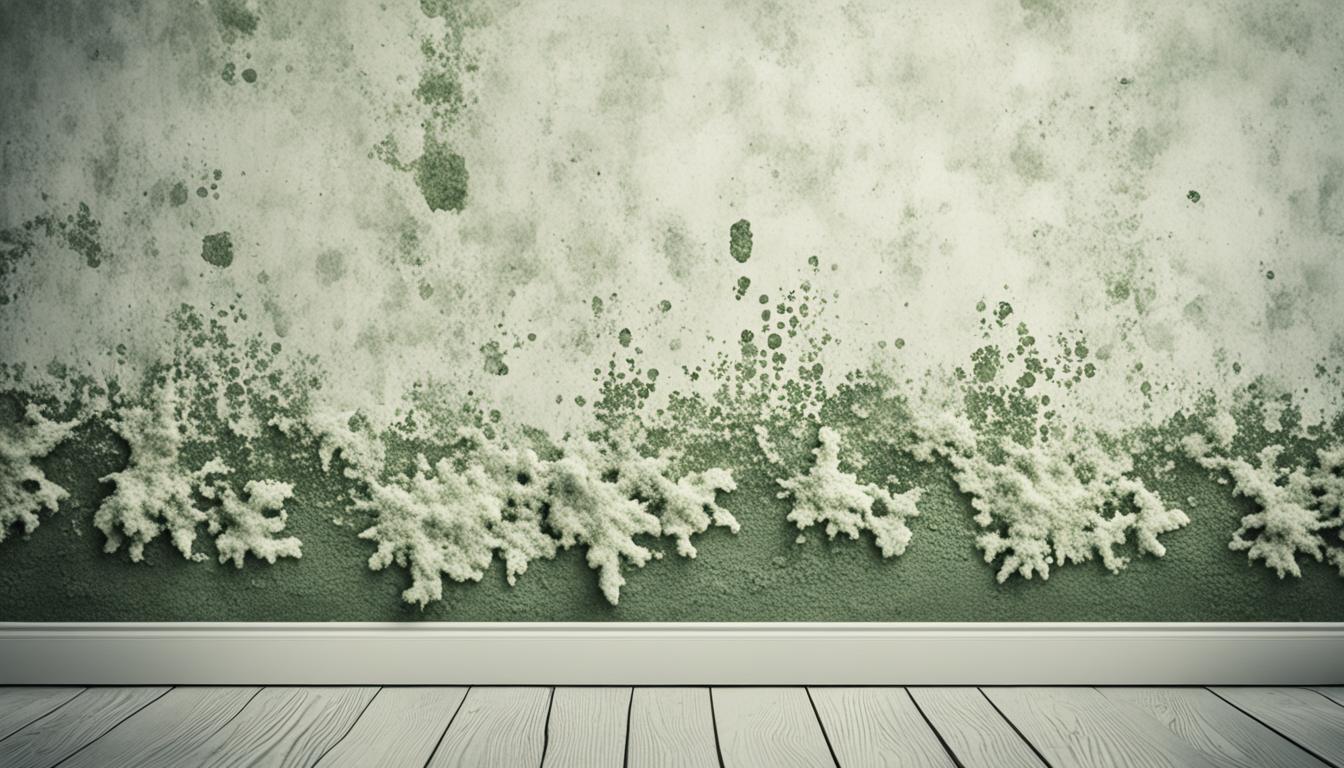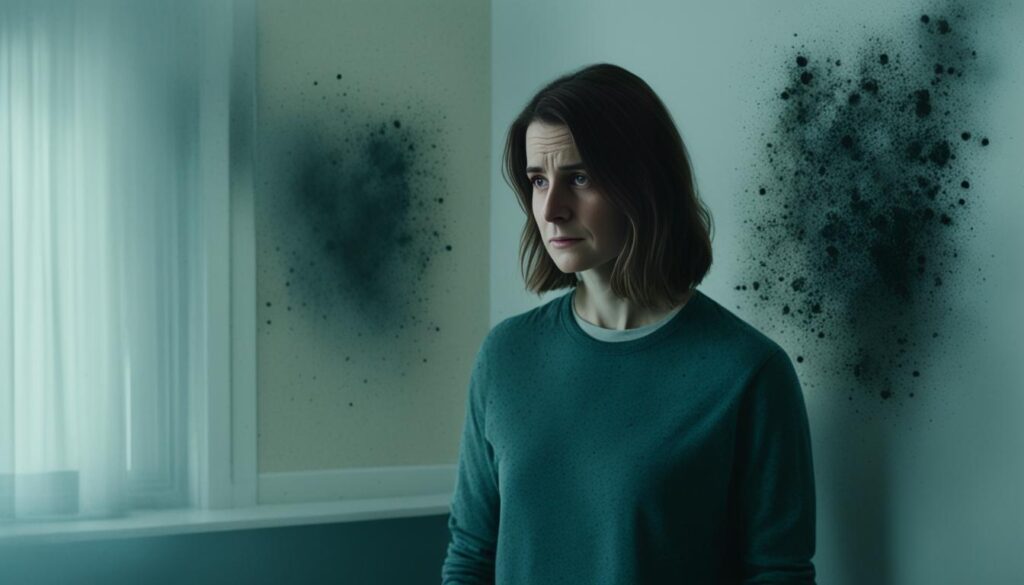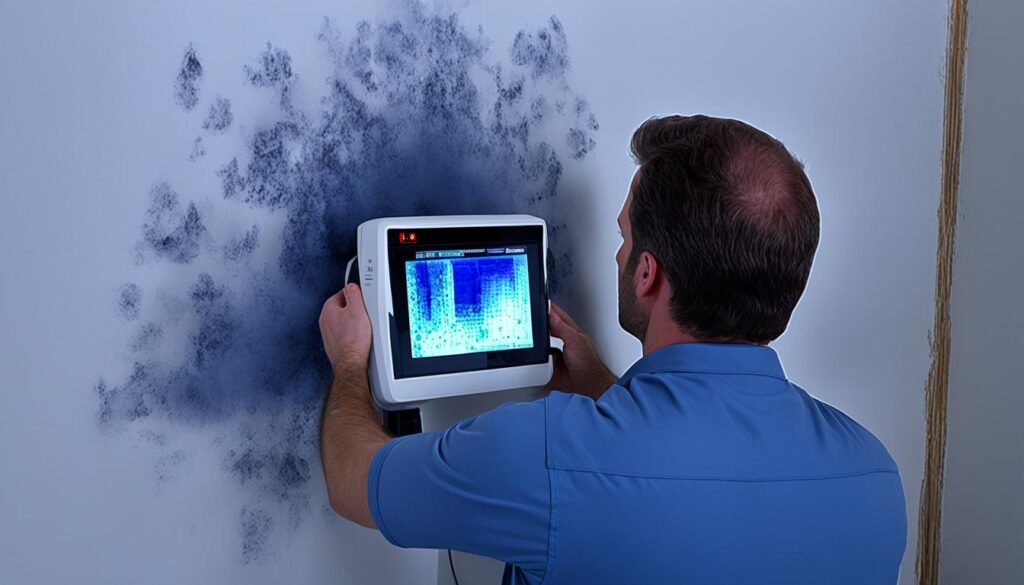
Can Mold in Walls Make You Sick? Health Risks Explored
Mold is a common problem that can occur in various parts of our homes, including walls. While mold is unsightly and can cause structural damage, many people are unaware of the potential health risks it poses. In this article, we will explore the connection between mold in walls and its effects on human health.
Hidden mold in walls can have a significant impact on our well-being. When mold spores are present, they can become airborne and be inhaled, leading to respiratory issues. Individuals with allergies or asthma are particularly vulnerable, as exposure to mold can trigger symptoms and exacerbate existing conditions.
Furthermore, certain types of mold can produce mycotoxins, which are toxic substances that can have detrimental effects on human health. Prolonged exposure to mycotoxins can result in a range of symptoms, including headaches, fatigue, dizziness, and even more severe conditions.
Key Takeaways:
- Hidden mold in walls can contribute to respiratory issues, especially for individuals with allergies or asthma.
- Certain types of mold can produce mycotoxins, which are toxic substances that can affect overall health.
- Prolonged exposure to mold and mycotoxins can lead to various symptoms, including headaches and fatigue.
- It is crucial to identify and address mold issues promptly to reduce the risk of adverse health effects.
- If you suspect mold in your walls or are experiencing unexplained health symptoms, seek the expertise of professionals like Fix Mold Miami for a comprehensive mold assessment.
The Health Risks of Mold in Walls
When it comes to a safe and healthy living environment, the presence of mold in walls can pose significant health risks. Mold spores, which are microscopic particles released by mold, can become airborne and easily inhaled, leading to a range of respiratory issues.
Allergies and asthma are two common health problems associated with mold exposure. People with existing allergies may experience worsened symptoms when exposed to mold spores, such as sneezing, coughing, and itchy eyes. For individuals with asthma, mold can trigger asthmatic episodes, causing difficulty breathing and chest tightness.
However, the health risks of mold in walls extend beyond allergies and asthma. Mold has the potential to produce mycotoxins, toxic substances that can have detrimental effects on human health. These mycotoxins can be inhaled or come into contact with the skin or eyes, leading to more severe conditions like respiratory infections, chronic obstructive pulmonary disease (COPD), and even neurological issues.
The presence of mold in walls can lead to a range of respiratory issues, allergies, asthma, and even more severe conditions like respiratory infections and neurological issues due to exposure to mycotoxins.
Furthermore, prolonged exposure to mold can weaken the immune system, making individuals more susceptible to infections and illnesses. This is especially concerning for those with compromised immune systems, such as the elderly, young children, and individuals with pre-existing health conditions.

To safeguard your health and the well-being of your loved ones, it is crucial to address mold issues promptly. By identifying and eliminating mold growth in walls, you can mitigate the health risks associated with mold exposure. Consider seeking the expertise of professionals like Fix Mold Miami, who specialize in comprehensive mold assessments, prevention, and remediation. Contact Fix Mold Miami at 305-465-6653 for a thorough mold assessment and ensure a healthy living environment.
Identifying Hidden Mold in Walls
In order to prevent the health risks associated with mold in walls, it is crucial to identify its presence as early as possible. Hidden mold can thrive in moist and poorly ventilated areas, making detection challenging. However, there are several common signs that can help you identify the presence of mold in your walls.
Common Signs of Hidden Mold
- Musty Odors: If you detect a persistent musty smell in your home, especially in specific areas or rooms, it could indicate the presence of hidden mold.
- Discoloration: Look for any visible signs of discoloration on your walls, such as dark spots or patches. Mold often appears as black, green, or brown stains.
- Water Stains: Water stains on your walls are a clear indication of a moisture issue, which is an ideal environment for mold growth. Investigate any water stains promptly to determine if mold is present.
If you notice any of these signs, it is important to take immediate action. Mold can spread rapidly and have adverse effects on your health.
The Significance of Professional Mold Assessments
While visible signs can indicate the presence of mold, they do not provide a comprehensive assessment of the extent of mold growth. To accurately identify and evaluate hidden mold in walls, it is advisable to seek the assistance of professionals specializing in mold assessments.
A professional mold assessment involves a thorough inspection of your property using specialized equipment and techniques. This allows experts to identify hidden mold that may not be visible to the naked eye. They can also measure the concentration of mold spores in the air to determine the severity of the issue.
By opting for a professional mold assessment, you can gain a comprehensive understanding of the mold problem in your walls. This knowledge is crucial for developing an effective remediation plan and ensuring a healthy living environment for you and your loved ones.

It is important to prioritize the identification and remediation of mold in your walls to protect your health and well-being. In the next section, we will explore the conclusion of this article and provide guidance on addressing mold issues effectively.
Conclusion
In conclusion, the presence of mold in walls can indeed pose health risks and potentially make you sick. Mold spores that are released into the air can be inhaled and trigger respiratory issues such as allergies, asthma, and other more severe conditions. Moreover, certain types of mold can produce mycotoxins, which can have detrimental effects on human health.
To safeguard your well-being and that of your family, it is crucial to address mold issues promptly. If you suspect the presence of mold in your walls, it is advisable to seek the expertise of professionals like Fix Mold Miami. With their specialization in mold assessments, prevention, and remediation, they can effectively identify and mitigate mold growth in your walls.
For a comprehensive mold assessment and to ensure a healthy living environment, you can contact Fix Mold Miami at 305-465-6653. Their experienced team will provide the necessary guidance and services to help you address any mold-related concerns, thus reducing the risk of adverse health effects and promoting a safe and healthy indoor environment.




